Empowering Your Child: A Guide to Mental Health Treatment Options
Recognize potential mental health concerns early. Watch for warning signs like changes in mood, sleep, appetite, or behavior. Trust your parental instincts if something seems off.
Consult with your child’s pediatrician or a mental health professional. They can assess your child, provide an accurate diagnosis, and recommend appropriate treatment options.
Explore evidence-based therapies like cognitive-behavioral therapy (CBT), family therapy, or play therapy. These approaches help children develop coping skills, improve communication, and work through emotional challenges.
Consider medication if recommended by a …



